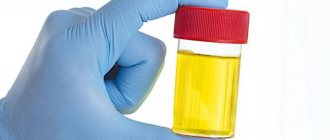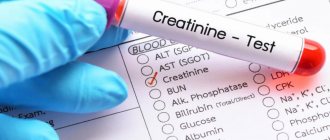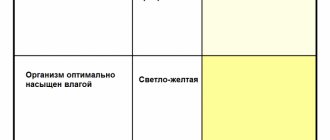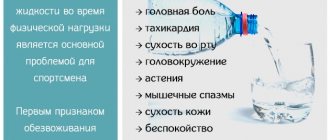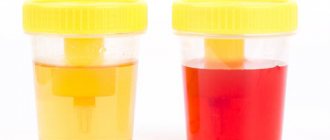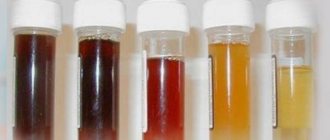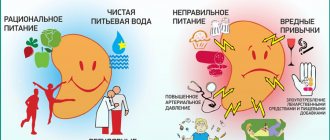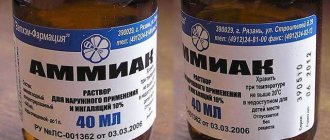general characteristics
Deoxypyridinoline (DPID) refers to the degradation products of bone tissue collagen (its amount is minimal in other organs and tissues). It enters the bloodstream during bone resorption and, without undergoing further metabolic transformations, is excreted unchanged in the urine. The nature of the diet does not affect the amount of DPID excretion, since DPID supplied with food is not absorbed in the intestine. Quickly responds to changes in bone remodeling, informs about the activity of the process, in contrast to densitometry, and is an early diagnostic criterion.
Preparing for urine collection
Collecting urine for general analysis in a container with a preservative
First, you need to get a container with a built-in adapter from the medical office, as well as a test tube with a preservative.
On the eve of the test, we recommend not to eat vegetables and fruits that can change the color of urine (beets, carrots, etc.) and not to take diuretics.
Before collecting urine, it is necessary to perform a hygienic toilet of the genital organs. Women are not recommended to take a urine test during menstruation. Collect approximately 50 milliliters of morning urine in a container. To properly conduct the study, during the first morning urination, release a small amount of urine (the first 1 - 2 seconds) into the toilet, and then, without interrupting urination, place a container for collecting urine, into which you need to collect approximately 50 milliliters of urine.
Immediately after collecting urine, close the container tightly with a screw cap. Place the test tube with the rubber stopper down into the recess on the lid of the container, and the test tube will begin to fill with urine. After urine stops flowing into the test tube, remove the test tube from the punch. Invert the tube several times to better mix the urine with the preservative.
The test tube with urine must be delivered to the medical office during the day (according to the biomaterial reception schedule until 17.30). If it is not possible to immediately deliver urine to a medical office, then the test tube with urine should be stored at a temperature of +2...+8°C.
Collection of 24-hour urine for biochemical analysis
For such an analysis, you need to collect urine a day before, and the first morning portion of urine is removed. All subsequent portions of urine excreted during the day, night and the morning portion of the next day are collected in one container, which is stored in the refrigerator (+4...+8°C) during the entire collection time (this is a necessary condition, since at room temperature it is significantly glucose levels decrease).
After completing urine collection, the contents of the container must be accurately measured, be sure to mix and immediately pour into a small jar (no more than 5 milliliters). Bring this jar to the medical office for examination. You don't need to bring all your urine. On the referral form you need to indicate the daily volume of urine (diuresis) in milliliters, for example: “Diuresis 1250 milliliters”, also write down the patient’s height and weight.
Before 10 am (1st or 2nd morning urine sample), a urine sample is taken to determine DPID.
Collection of urine for the analysis “Catecholamines in urine”
Collecting urine for the analysis “Catecholamines in urine”, “Metabolites of catecholamines in urine” and “Metanephrines, fractions”, see instructions for collecting urine in the corresponding tests - No. 151, No. 152, No. 950, No. 1166.
Collection of urine for research to determine psychoactive substances
Obtain an SCM container (sterile container with lid, 30 milliliters) from the medical office. Urine should be collected in a clean, unused container. Impurities of hypochlorite, detergents and other substances can distort the result.
Immediately after collection, urine should be placed in a container with a tight lid (SCL) to prevent evaporation and oxidation. The urine collection container should be 90% full to prevent evaporation under the lid. The container should be brought to the medical office within a day. If it is not possible to immediately deliver urine, then the container with urine should be stored in the refrigerator at +2...+8°C (but not more than 36 hours).
Urine collection for urine culture (with antibiotic susceptibility testing)
To collect urine, a hygienic procedure must be carried out. You need to unscrew the lid of the container and remove the applicator with the tampon. Dip the sponge swab into the urine sample for 5 seconds until the sponge is completely saturated with urine or directly urinate on the swab. Return the applicator with the swab to the test tube and close it tightly.
Label the sample on the label located on the tube. Store material at room temperature. Do not wring out the sponge in the test tube. There is no need to urinate directly into the test tube.
Remember that only the attending physician, who has the opportunity to observe the patient’s condition and explain the need to prescribe certain tests, can draw up an optimal laboratory examination program and evaluate the test results.
Indications for use
1. Diagnosis and monitoring of the activity of resorptive processes in bone tissue, primarily osteoporosis of various origins (hyperparathyroidism, menopause, thyrotoxicosis and hypercortisolism, including iatrogenic ones). 2. Monitoring the effectiveness of osteoporosis treatment (considered effective if DPID excretion decreases by 25% within 3-6 months of treatment.) It is most advisable to determine DPID simultaneously with osteocalcin in order to assess the rate of bone metabolism.3. Bone metastases. 4. Multiple myeloma. 5. Arthritis.
results
Analysis can be targeted or extensive. Among the main hormonal urine tests, several basic test groups should be distinguished:
- urine steroid profile;
- cortisol;
- catecholamines and their intermediate metabolites;
- C-peptide.
Other tests may be added as needed, such as DPID (used to diagnose bone resorption).
Cortisol
It is a corticosteroid responsible for emotional stability under stress. Its excess indicates a tumor process in the adrenal glands, pituitary gland, hypothalamus, genitals, and speaks of hyperthyroidism or obesity.
Reduced cortisol is evidence of decreased functionality of the glandular tissue of the adrenal glands, pituitary gland, thyroid gland or long-term use of steroid drugs.
Normal: from 27.6 to 276 nmol/day
Steroid profile
Analysis of the steroid profile (17-ketosteroids) in one approach reveals the concentration and ratio of male sex hormones and their precursors in the body. Allows you to find out the causes of hirsutism, virilization, some hormone-dependent tumors, as well as determine the causes of infertility and miscarriage.
The general norm is 4.1-13.7 nmol/day.
- Androstenedione – essential for diagnosing and monitoring hyperandrogenic conditions in general.
- Androsterone - an elevated background is characteristic of Itsenko-Cushing syndrome, polycystic ovary syndrome, tumor process of the gonads and adrenal glands.
- Ethiocholanolone is an indicator of complex forms of hirsutism.
- Dehydroepiandrosterone is a prohormone, the main androgen of the adrenal glands. Violation of its level is observed in adrenal hyperandrogenism.
In addition, data can be obtained for pregnanediol and pregnanetriol, which reflect changes in the level of progesterone secretion during different phases of the menstrual cycle and during pregnancy.
Catecholamines and their metabolites
Catecholamines are a group of hormones and neurotransmitters of the central nervous system. Provide a protective reaction of the body to irritants. Their main representatives are: adrenaline, norepinephrine, dopamine.
Under normal conditions, catecholamines bind to proteins and are deactivated. An increase in their level in the urine is a clear sign of a chromaffin tumor:
- a high level of norepinephrine determines the presence of pheochromocytomas (normal: 29-1151 mcg/day);
- increased adrenaline indicates the location of tumors inside the adrenal gland (normal: 2-31 mcg/day);
- an increase in dopamine indicates a malignant process (normal: 283-1002 mcg/day).
IMPORTANT! Indicators of catecholamine levels must be assessed in a complex manner and taking into account the patient’s full medical history. The results can be affected by various mental and nervous disorders, thyroid conditions (hyperthyroidism), and heart disease.
Reduced levels of catecholamines indicate the likelihood of diabetes mellitus or Parkinson's disease.
Patient preparation rules
Standard conditions:
First morning urine. In the morning until 10-00. Before collecting urine, be sure to toilet the external genitalia. When studying dynamics, all subsequent samples should be collected at the same time of day and during the same morning urination. Random urine. Any portion of urine, regardless of the time of day. Urine is collected after toileting the external genitalia.
You can add this study to your cart on this page
How to properly prepare for the procedure
ATTENTION! Taking hormonal medications must be stopped 1 month before the test. If this is not possible, be sure to tell your doctor what drug you are taking and in what dosage.
Adjust your daily diet in advance (3-7 days in advance):
- give up alcohol, marinades, hot spices;
- exclude from the menu foods that color urine in bright colors (beets, carrots, vitamin concentrates), as well as stimulants (coffee, tea, chocolate, guarana);
- stop taking medications (if this is not possible, notify your doctor);
- avoid emotional and physical overload.
Prepare a large non-metallic container (for example, a 3-liter glass jar). Wash it, rinse thoroughly with clean water, being careful not to leave detergent particles on the surface. Let it dry.
The container is necessary to collect all daily urine (urine excreted by the body over a period of 24 hours). Additionally, purchase a sterilized plastic container for transporting the sample (150 ml capacity) from the pharmacy.
Indicators of general urine analysis.
Normally for humans, urine values correspond to certain reference values. Deviations from these values may indicate the presence of diseases.
When examining a sample during a clinical urine test, the laboratory evaluates the following indicators:
- physical indicators (color, transparency, density, acidity)
- biochemical parameters (protein, glucose, nitrites, bilirubin, ketone bodies)
- microscopic examinations (epithelial cells, sediment, salts, erythrocytes and leukocytes, casts, bacteria, fungi)
For example, an increase in protein in the urine may indicate kidney disease, an inflammatory process in the genitourinary system, the presence of bilirubin indicates a malfunction of the liver, an increase in sugar levels is a “classic” sign of diabetes, and salts in the urine often signal the possibility of stone formation in the urine. kidneys.
Deviation of the same indicators from the norm can indicate both serious diseases and increased consumption of certain products or violation of collection rules. Therefore, we recommend that you entrust the interpretation of test results to professionals.
When is a general urine test prescribed?
A general urine test allows us to judge the condition of the kidneys, urinary system, and indirectly the composition of the blood. With the help of OAM, diseases can be detected at an early stage, when other symptoms have not yet appeared. Indications for a general clinical urine test may be:
- preventive examination of the body's condition (dispensary examination)
- diagnosis of kidney and genitourinary system diseases
- monitoring and evaluation of the effectiveness of treatment
General urine analysis at the Istok Health Clinic, Zvenigorod
- At the Istok Health Clinic, a general urine test can be performed for adults and children from the first days of life .
- We cooperate with the CMD laboratory based on the Research Institute of Epidemiology of Rospotrebnadzor, which guarantees the quality of the results obtained.
- The results of a general urine test will be ready the next day . You can receive them at the Clinic in the afternoon, view them in your personal account , or we will send them to you by email.
- We offer you to take a general urine test at the Istok Health Clinic at one of the best prices in Zvenigorod, without waiting or queuing, in a comfortable environment.
